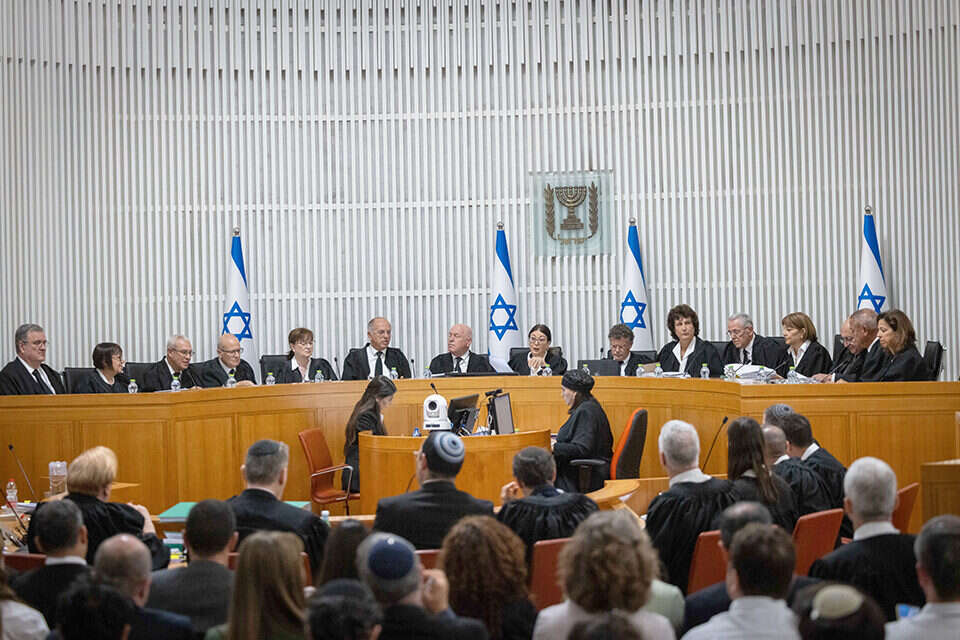In the historic ruling by the High Court of Justice on Monday to invalidate the Reduction of the Cause of Reasonableness Law, in which a Basic Law was struck down for the first time in the state, eight Supreme Court justices supported against seven who dissented.
Each judge had his own reason for deciding whether to support or dissent. In addition, 12 Supreme Court justices explained why they ruled in favor of the possibility that the High Court of Justice could hear and invalidate Basic Laws, while three justices explained why the High Court of Justice did not have the authority to do so.
The justices who supported and the judges who dissented, photo: Oren Ben Hakon, Noam Rivkin Fenton, Jonathan Zindel/Flash 90, Dudi Vaknin, Courts website,
Esther Hayut: The court has the authority to intervene in Basic Laws in exceptional cases where the Knesset exceeds its authority and harms democracy. Denying the authority to intervene sweepingly in the reasonableness of government decisions is such an infringement that also contravenes the principle of separation of powers.
Yael Willner: The High Court of Justice has the authority to intervene in Basic Laws in extreme cases of harm to democracy. The Basic Law does not categorically rule out criticism of the reasonableness of government decisions, reduces reasonableness, and there are additional grounds for reasonableness – therefore, there is no harm to democracy.
Yosef Elron: The High Court of Justice has the authority to intervene in Basic Laws only in exceptional cases of violation of basic rights of the individual and as a last resort only. Regarding reasonableness, the Basic Law does not sweepingly eliminate interference in government decisions by virtue of reasonableness, but rather reduces reasonableness itself.
Alex Stein: The High Court of Justice has the authority to intervene in Basic Laws that contradict the Declaration of Independence. The Law of Reasonableness does not completely rule out interference in government decisions, but rather reduces reasonableness, especially since there are additional grounds for intervention. Hence it is not contrary to the scroll.
Yitzhak Amit: The High Court of Justice has the authority to intervene in Basic Laws that harm democracy. The Law of Reasonableness categorically rejects criticism of the government on the grounds of reasonableness and therefore harms democracy.
The High Court of Justice discusses the grounds of reasonableness (archive), photo: Jonathan Zindel/Flash90
Gila Kanfi-Steinitz: The High Court of Justice has the authority to intervene in Basic Laws in extreme cases, especially in a fatal blow to democracy to which the Basic Law regarding reasonableness does not answer "and far from it." The law does not completely rule out interference in government decisions, but rather reduces reasonableness.
Ruth Ronen: The court has the authority to intervene in Basic Laws that harm democracy. The Basic Law completely rejects judicial intervention on the grounds of reasonableness with an inherent conflict of interest on the part of the Knesset, and therefore harms democracy.
Yechiel Kasher: The High Court of Justice has the authority to intervene in a Basic Law that harms democracy, but not every reduction of judicial review is such an infringement. Even with the Basic Law, judicial review is effective and therefore there is no harm to democracy.
Uzi Fogelman: The High Court of Justice has the authority to intervene in Basic Laws that harm democracy. The Basic Law categorically denies intervention by the High Court of Justice on the grounds of reasonableness and therefore harms democracy and the separation of powers.
David Mintz: The court does not have the authority to intervene in Basic Laws and must act according to the law as required of the other authorities. Such intervention contravenes the principles of democracy and the court has a conflict of interest. The law does not prevent judicial review; Israel is a democracy even after its enactment.
Halad Kabub: The High Court of Justice has the authority to intervene in Basic Laws that harm democracy. The Basic Law on Reasonableness sweepingly prevents judicial review by virtue of the cause of reasonableness and therefore must be repealed.
Minister of Justice Yariv Levin. The High Court of Justice annulled the law passed as part of the reform, photo: Alex Kolomoisky
Anat Baron: The High Court of Justice has the authority to intervene in Basic Laws that contradict democracy. The Basic Law completely rejects judicial intervention in government decisions on the grounds of reasonableness, which is a fatal blow to democracy and the separation of powers.
Ofer Grosskopf: The High Court of Justice has the authority to intervene in Basic Laws that contradict democracy. The Basic Law on Reasonableness completely denies judicial intervention on the grounds of reasonableness, thereby violating the principle of separation of powers, contradicting previous Basic Laws, and does not enjoy broad consensus.
Dafna Barak-Erez: The High Court of Justice has the authority to intervene in Basic Laws that contradict democracy and the Declaration of Independence. The Basic Law on Reasonableness severely harms democracy because it completely rejects interference on the grounds of reasonableness and the discharge of the gatekeepers.
Noam Sohlberg: The High Court of Justice has no authority to intervene in Basic Laws, while such intervention contradicts democracy and popular sovereignty and is not at all a "trial."
Wrong? We'll fix it! If you find a mistake in the article, please share with us

